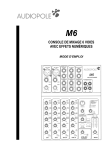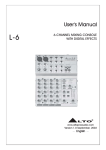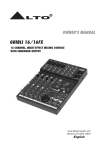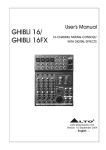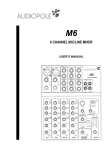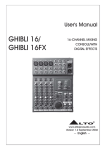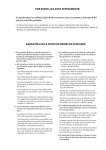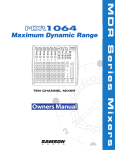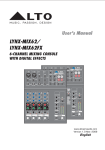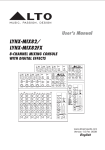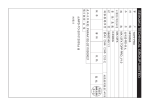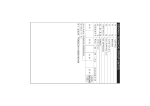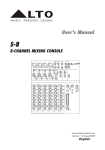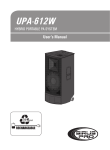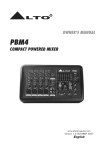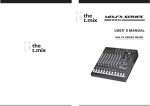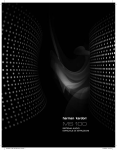Download MX - Topp Pro Professional Audio Gear
Transcript
MX MX.6FX 6-CHANNEL MIXING CONSOLE WITH DIGITAL EFFECTS MIC INPUT MIC INPUT STEREO AUX RETURNS AUX SENDS CTRL RM OUT L L PHONES R BAL UNBAL R BAL UNBAL MX.6FX 6-CHANNEL MIXING CONSOLEWITH DIGITAL EFFECTS MONO LINE LINE 60 1 MX MONO 2 TRACK IN OUT MAIN OUT L L BAL UNBAL BAL UNBAL R R L L R R 60 2 3/4 5/6 IN 16 1 2 3 15 14 4 13 5 6 12 11 7 10 9 8 PRESETS FX LEVEL OUT 1 2 3 4 5 8 9 12 13 16 VIBRAFLANGE FUNKY ROCKABILLY BIGSTAGE VIBRATO FLANGER CHORUS PEAK REVERB LEVEL MASTER AUX SEND PHANTOM POWER CLIP 10 PHANTOM BAL 0 BAL -4 -10 2TK TO CTRL ROOM NF03519-1.0 2TK TO MIX -30 L R MX MX 15 MX MX 1. INTRODUCTION ............................................................................................................4 2. FEATURES .....................................................................................................................4 3. USEFUL DATA ..............................................................................................................4 4. CONTROL ELEMENTS.................................................................................................6 5. INSTALLATION TIPS.....................................................................................................9 6. WIRE CONNECTION.....................................................................................................10 7. APPENDIX.....................................................................................................................11 8. PRESET LIST.................................................................................................................11 9. TECHNICAL SPECIFICATIONS ...................................................................................12 10. BLOCK DIAGRAM .....................................................................................................13 11. GUARANTEE............................. ................................................................................14 12.NOTES..................................... ...................................................................................15 14 MX MX Thank you for purchasing the MX.6FX 6-channel mixing console with 24-bit digital multi-effect. MX.6FX mixing console is a remarkable compact mixing desk that does not find many equals in the market today. With 2 microphone and 2 stereo Line-level inputs for small live performances, small studio recording and general PA applications, MX.6FX also includes a 24-Bit digital multieffect with 16 Factory Presets and separate level for digital reverb. There is a 3- band EQ on all input channels and separate Main Mix and Control Room outputs for operation with different volume settings. Use it for small GIGs and RECORDING. MX.6FX also is a flexible tool for Multimedia presentations. Thank you again for making right choice in purchasing the TOPP PRO MUSIC GEAR. 2 MIC input channels with gold plated XLR and balanced LINE input 2 stereo input channels with balanced TRS jacks Ultra-low noise discrete MIC pre-amps with +48V Phantom power Extremely high headroom offering extra dynamic range Balanced inputs for optimal signal integrity Warm, natural 3-band EQ on each channel Built-in 24 bits digital effects processor Peak LED on each channel AUX send for internal/external effects or stage monitoring Main output, Control room and headphone outputs 2-Track inputs assignable to main mix, control room/headphone outputs Highly accurate 6-segment bar graph meters 13 MX 9 MX HOOKUP DIAGRAM SMALL GIG Mono input channels Frequency response Distortion (THD & N) 0.005% at +4 dBu, 1 kHz Gain range 0 dB to 60 dB (MIC) SNR (Signal to Noise Ratio) Line input MIC INPUT Equalization 10 Hz to 55 kHz, +/ 3 dB Distortion (THD & N) 0.005% at +4 dBu, 1 kHz DSP Section 10 Hz to 55 kHz, + / 3 dB Distortion (THD & N) 0.005% at +4 dBu, 1 kHz Microphone Input 1.4 k Ohms 10k Ohms or Greater Main Mix Section 120 Ohms Hi shelving +/ 15 dB @12 kHz Mid bell +/ 15 dB @ 2.5 kHz Low shelving +/ 15 dB @ 80 Hz A/D and D/A converters 24-bit 6-CHANNEL MIXING CONSOLEWITH DIGITAL EFFECTS Physical 60 L L BAL UNBAL BAL UNBAL R R L L DAT OR TAPE RECORDER R R 2 3/4 5/6 DAT OUT IN 16-position PRESET Selector, FX level, REVERB level, CLIP LED. Max Output +22 dBu Unbalanced,1/4'' Jacks AUX Sends max out +22 dBu HEADPHONE TV SCREEN MIC INPUT MIC INPUT STEREO AUX RETURNS Net weight 1.4 Kg (3.09 lb) Shipping weight 2.7 Kg (5.95 lb) L PHONES R BAL UNBAL R BAL UNBAL MX . 6FX 6-CHANNEL MIXING CONSOLEWITH DIGITAL EFFECTS MONO LINE 60 1 MONO 2 TRACK IN OUT MAIN OUT L L BAL UNBAL BAL UNBAL R R USA / Canada 100-120 V~, 60 Hz 230 mm CTRL RM OUT CD PLAYER to +15 dB 185 mm AUX SENDS L LINE Europe 210-230 V~, 50 Hz U.K. / Australia 240 V~, 50 Hz 15 Watts ZONE 2 ACTIVE SPEAKERS WIRELESS MIC STEREO AUDIO FROM TV Fader 0dB,Channels muted:-100dBr (ref:+4dBu) Fader 0dB, All Input Channels Assigned And Set To UNITY Gain:-90dBr(ref:+4dBu) Dimension(W D H) ACTIVE SPEAKERS (ALTO PS4 HA) DRUM MACHINE L L 2 TRACK RECORDER R R 60 2 3/4 5/6 IN OUT 35/55 mm GUITAR D/I BOX DRUM MACHINE 12 2 TRACK IN OUT MAIN OUT 60 1 24-bit Vibraflange, Funky, Rockabilly, Bigstage, Vibrato1-4,Flanger1-4, Chorus1-4 Controls Power Supply (AC/DC Adaptor) Fuse Power Consumption LINE MONO BAR, PUB, RESTAURANT 16 Main voltage MX.6FX BAL UNBAL KEYBOARD Presets AUX Returns gain range R 1k Ohms All Other Outputs Noise(Bus Noise) CD PLAYER PHONES LINE Frequency response CTRL RM OUT L MONO Balanced Type of effects AUX SENDS R BAL UNBAL Line input DSP resolution STEREO AUX RETURNS MIC INPUT 115 dB electronically balanced Frequency response All Other Input Tape Out DIGITAL EFFECT UNIT L Stereo input channels Impedance MIC 2 MIC 1 electronically balanced, discrete input configuration 10 Hz to 55 kHz, +/ 3 dB Microphone input Input Channels POWERED STAGE MONITORS MX.6FX MIXING CONSOLE Model Number MAIN ACTIVE SPEAKERS MX MX FRONT PANEL MIC INPUT 1- MIC INPUT MX.6FX is equipped with 2 low-noise microphone preamplifiers with optional phantom power, 60 dB of Gain and 115 dB of S/N ratio. You can connect almost any type of microphone. Dynamic microphones do not need phantom power. Use phantom power only with condenser microphones but make sure that the phantom power button is disengaged before connecting the microphone. Phantom power will not damage dynamic microphones but it may damage tube or ribbon microphones so make sure to read the microphone instructions manual before engaging phantom power. Use switch (24) to activate/deactivate phantom power. These two channels are also equipped with 1/4" TRS balanced/unbalanced LINE-IN plugs to connect line-level instruments such as keyboards, drum machines and effect devices. NOTE: Never try to connect a line-level signal to the XLR MIC input when the phantom power is engaged or you may seriously damage your equipment. 2- STEREO LINE INPUTS 1 BAL UNBAL LINE 30 3 Disconnect the POST route Before AUX Solder the PRE route After 1 MONO L BAL UNBAL R 2 3- TRIM This control is provided with 2 different indication rings: one is for the MIC and the other for the LINE input. When you use a Microphone, you shall read the MIC ring (0~60 dB); when you use a line level instrument, you shall read the LINE ring (+15~-45 dB). For optimum operation, you shall set this control in a way that the PEAK LED will light up only occasionally in order to avoid distortion on the input channel. 4- STEREO AUX RETURNS You can use these stereo 1/4" phone sockets to return the stereo signal of an effect unit to the Main Mix. Alternatively you can use them as an extra auxiliary input and using the AUX RETURN level control as volume control. The signal will be sent directly to MAIN MIX control. STEREO AUX RETURNS L 5- AUX SEND 6- PHONES This socket will be used to send the signal to a pair of headphones. AUX 60 These are channels 3/4, and 5/6. They are organised in stereo pair and provided with 1/4" TRS phone sockets. If you connect only the left jack, 3/4 the input will operate in mono mode, that's mono signal will appear on both input channels. You can use these inputs with a stereo keyboard, drum machine, etc. This 1/4" phone socket is used to send out the signal from AUX bus of the input channels into external devices such as effect units and/or stage monitors. AUX SEND is wired post-fader to control the signal of the internal multi-effects unit. You can also connect an external effect unit. In such case, the internal effect unit will be automatically disconnected. If you want to wire the AUX circuit as pre-fader, read Chapter 6. of this Manual. In the pre-fader mode, the AUX bus can send the signal to a stage monitor. PREFADER AND POSTFADER CONSIDERATIONS Interesting consideration! Where are the faders in your MX.6FX Actually a fader is usually regarded as a slider, that is a linear potenti- (PRE) ometer. All potentiometers in your MX.6FX are of rotary type but we POST keep the pre-fader/post-fader description that is quite industry standard and easily understandable. When your MX.6FX leaves the Factory, the AUX bus of all input channels is wired post-fader. In this way, the Aux bus can be used for the internal or external multi-effect. If you want to use the MX.6FXAux bus for powered stage monitors, you should disconnect the above-indicated POST route track and (PRE) solder the PRE route track like in this drawing. In this way, the signal is routed to the AUX SENDS output before the Channel Level control. POST 4 NO. Preset Description Parameter 1 VibraFlange Slight pitch variation with Flanger effect. Mode Level: 90% 2 Funky Large pitch variable with heavy Flanger effect. Mode Level: 68% 3 Rockabilly Simulate a stage space with slight Flanger effect. Rate: 0.1 Hz 4 Big stage Simulate a stage space of the sound. Decay time: 5.4s 5 Vibrato 4 Slight variation of pitch resulting from the free oscillation of the vocal cords. Rate: 4.8 Hz 6 Vibrato 3 Slight variation of pitch resulting from the free oscillation of the vocal cords. Rate: 3.8 Hz 7 Vibrato 2 Slight variation of pitch resulting from the free oscillation of the vocal cords. Rate: 3.0 Hz 8 Vibrato 1 Slight variation of pitch resulting from the free oscillation of the vocal cords. Rate: 2.0 Hz 9 Flanger 4 Simulate to play with another person carrying out same the notes on the same instrument. Rate: 4.9 Hz 10 Flanger 3 Simulate to play with another person carrying out same the notes on the same instrument. Rate: 3.21 Hz 11 Flanger 2 Simulate to play with another person carrying out same the notes on the same instrument. Rate: 0.9 Hz 12 Flanger 1 Simulate to play with another person carrying out same the notes on the same instrument. Rate: 0.56 Hz 13 CHORUS 4 Recreate the illusion of more than one instrument from a single instrument sound Rate: 3.6 Hz 14 CHORUS 3 Recreate the illusion of more than one instrument from a single instrument sound Rate: 1.79 Hz 15 CHORUS 2 Recreate the illusion of more than one instrument from a single instrument sound Rate: 0.82 Hz 16 CHORUS 1 Recreate the illusion of more than one instrument from a single instrument sound Rate: 0.39 Hz R AUX SENDS 5 PHONES 7- CTRL ROOM OUTPUT These 1/4" phone sockets will be used to send the signal to a pair of powered Studio Monitor speakers or to a second set of PA. 6 11 MX MX Either the 1/4" TRS phone jack or XLR connector can be wired in balanced and unbalanced modes, which will be determined by the actual application status, please wire your system as the following wiring examples: For 1/4" Phone jack + - + Tip + Tip Ring Ring Sleeve Sleeve This stereo output is controlled by the Main Mix Level on Master section and will send the audio signal to an amplifier or to a pair of active speakers. The output level can be varied from - to +15 dB. CTRL RM OUT L R 9- TAPE IN Use the Tape input to connect a CD Player, Tape, DAT, iPOD or any other line-level source. You can send this signal either to CONTROL ROOM OUTPUT and/or to the MAIN MIX OUTPUT using the relative 2TK TO select buttons. Tip Sleeve TRS Type Balanced TS Type Unbalanced 8- MAIN MIX OUTPUTS MAIN OUT L 10- TAPE OUT TRS Type Unbalanced 7 R 8 These RCA jacks will route the main mix signal into a tape or DAT recorder. For XLR Connector CHANNEL STRIP Pin2 (+) Pin3 (-) (Linked to Pin1 manually, Pin2 (+) Pin3 (-) ) Pin1 ( ) Pin1 ( ) XLR Type Unbalanced XLR Type Balanced In-line Connection For these applications the unit provides 1/4" TRS and XLR connectors to easily interface with most professional audio devices. Follow the configuration examples below for your particular connection. Balanced TIP RING SLEEVE SLEEVE RING TIP 3 3 1 1 2 2 1 3 2 TIP RING SLEEVE Tip Ring Sleeve Tip Ring Sleeve 1 2 1 2 3 3 Tip Ring 1 2 3 Sleeve Unbalanced 1 3 2 Tip Ring Sleeve TIP RING SLEEVE Tip 1 3 2 Sleeve 1 2 3 1 2 3 1 TIP SLEEVE 2 3 1 2 3 Tip TIP SLEEVE SLEEVE TIP Sleeve Tip Ring TIP RING SLEEVE SLEEVE RING TIP Cent r e Screen Tip Sleeve Tip Ring Sleeve Sleeve Tip Cent r e Sleeve Screen Tip Ring Centre Sleeve Screen TIP SLEEVE TIP RING SLEEVE 2 2 3 3 1 1 10 1 2 3 1 2 3 3-BAND EQ You have three EQ control for each mono and stereo input channel each providing +/-15 dB of boost and cut (MID is +/-12 dB). The signal will be unaffected when the controls are on center position. You may use an external equalizer to make up a mix properly but a master equalizer will not have effect on a single channel and you may overload the signal easily. Individual EQ will give you a much better control on single tracks. 11- HI If you turn this control up, you will boost all the frequencies above 12 kHz (shelving filter). You will add transparency to vocals & guitar and also make cymbals crispier. Turn the control down to cut all frequencies above 12 kHz. In such way, you can reduce sibilances of human voice or reduce the hiss of a Tape player. 12- MID This is a peaking filter and it will boost/cuts frequencies with their center at 2.5 kHz. This control will affect especially upper male and lower female vocal ranges and also the harmonics of most musical instruments. 13- LOW If you turn this control up, you will boost all frequencies below 80 Hz. You will give more punch to bass drums and bass guitar; and you will make the male vocalist more "macho". Turn it down and you will cut all the frequencies below 80 Hz. In this way you can avoid low-frequency vibrations and resonance thus preserving the life of your woofers. 2 TRACK IN OUT 9 L 10 R IN OUT 11 12 13 14 15 16 17 14- AUX SEND This control is used to adjust the level of the signal sent to AUX SENDS output (if nothing is connected to AUX SEND socket, the signal will be sent to the resident digital multi-effect), and such adjustment doesn't affect the main mix output signal at all. AUX is configured as POST fader, however, it can also be configured as PRE fader through internal modification. (For more detail, please refer to chapter 6) MX MX 15- PAN/BAL This is the PANORAMA control, or balance control. You can adjust the stereo image of the signal via this control. Keep this control in center position and your signal will be positioned in middle of stage. Turn this control fully counter clockwise and the signal will be present only on the left speaker and vice-versa. Of course a large number of intermediate positions is available. 16- PEAK LED This red LED will let you know about the status of the signals processed into MX.6FX. Connect a microphone or an instrument to MX.6FX and sing/play at normal volume. Set the level control of that channel so that the PEAK LED lights-up only occasionally. If this LED is always on, you are experiencing a lot of distortion and you should turn the TRIM control down or reduce the EQ boosting. If this led never lights up, turn the TRIM control up again. 17- LEVEL This knob controls the channel's level from - 24 MASTER AUX MASTER SECTION 18- MAIN MIX LEVEL This knob controls the level of the signal sent to MAIN OUTPUTS and TAPE OUT. Also AUX RETURNS signals will 22 be sent to this control. 23 10 PHANTOM 0 20 -4 2TK TO MIX -30 L R 18 19 28- FX LEVEL 29- REVERB LEVEL This control is used to adjust the output level of the REVERB signal, which can be varied from 0dB to 10 dB. The digital reverb is independent from the other 16 Factory Presets so you can add reverb in any amount over chorus,flanger, or just use reverb turning down FX LEVEL control. 30- PEAK LED This LED lights up when the input signal is too strong. -10 2TK TO CTRL ROOM Adjust this control to select the desired effect. There are a total of 16 Factory presets available including pitch-variations, Vibratos, Flanger, Chorus, etc. REAR PANEL 32 31 MX . 6FX NO 19- PHONES/CONTROL ROOM LEVEL This knob controls the signal sent to CONTROL ROOM OUTPUT & PHONESOUTPUT. PHANTOM POWER CLIP 21 27- PRESETS This control is used to adjust the output level of FX signal, which can be varied from 0dB to 10dB. 25 26 to +15 dB. SEND DSP SECTION Your MX.6FX includes a quite unique and innovative digital multi-effects with 24-bit resolution and high dynamic range. Unlike other multi-effects where all the presets are available in a sequence and vice a single control, MX.6FX multi-effect unit is organized with a 16 presets control and relative Level control for vibrato and modulation controls such as chorus and flanger. You can add reverb at any time with a separate Level control or you can just use the reverb keeping the FX level control turned down. 20- OUTPUT LEVEL METERS OFF These consist of two column of 6 LEDs each ranging from -30 dB to +18 dB (CLIP). The 0 LED corresponds to a level output of 0 dBu. The CLIP LEDs come to life when the output reaches +18 dBu. Set the MAIN MIX level control so that the CLIP LEDs only flashes occasionally. In general, you get a good mix level when the Meter LEDs operate in the range 0 to +10. If you exceed +10, you will get distortion. If even -30 LEDs are sleeping your signal-to-noise ratio will suffer. 21- AUX RETURNS (DFX) This knob controls the level of effects received from the STEREO AUX RETURN sockets. Such signals will be routed directly into the MAIN MIX. If you have no need to connect an external multi-effect, you can use AUX RETURN inputs as additional instrument inputs &use this as Volume control. 22- 2TK TO CTRL ROOM If you push down the 2TK TO CONTROL ROOM button, the 2 TRACK IN signal will be routed into the Control Room output and the level will be adjusted by the Control Room knob nearby the Main MIX LEVEL knob. 24- PHANTOM PWR Switch This button will apply +48 Volt Phantom Power only to the 2 XLR MIC input sockets. When condenser microphones are not used, please make sure 1 VIBRAFLANGE 16 1 2 3 15 2 FUNKY 3 ROCKABILLY 14 4 that the Phantom Power is disengaged. 4 BIGSTAGE 27 26- POWER LED This LED indicates when your MX.6FX is switched-on. 8 13 5 6 12 11 7 10 9 8 PRESETS 5 8 9 12 13 16 FX LEVEL PEAK REVERB LEVEL 1- Speakers should be placed in a position that allows for unobstructe sound projection. In many instances is beneficial for speakers to be elevated on tripod stands to achieve maximum dispersion and reach. 4- For best results match the speakers to a good amplifier that matches the wattage and impedance of your speakers. Proper amplification power results in good quality audio and longer component life. Check out the power requirement for your cabinet. FLANGER 28 32- POWER SWITCH This switch is used to turn the main power ON and OFF. 3- Use quality cables. Using quality cables will ensure the best possible sound. VIBRATO CHORUS 31- AC INPUT This connector is used to connect the supplied AC Adapter. 2- Use professional advice or service when hanging and installing speakers. Please take precautions to secure them to prevent them from falling and hurting someone. Care should be taken as to not damage the cabinet or its components. Please comply with all pertinent Regulations. 23- 2TK TO MIX If you push down the 2TK TO MIX button, the 2 TRACK IN signal will be routed into the MAIN output and will be adjusted by the MAIN MIX LEVEL knob. 25- PHANTOM LED This LED indicates when the PHANTOM POWER is engaged. AC Input: 18V ~ 50/60Hz 1000mA 29 5- Avoid pointing a microphone directly at an amplified speaker doing so, could cause feedback possibly damaging speaker components and your hearing. 30 Enjoy the sound! 9








